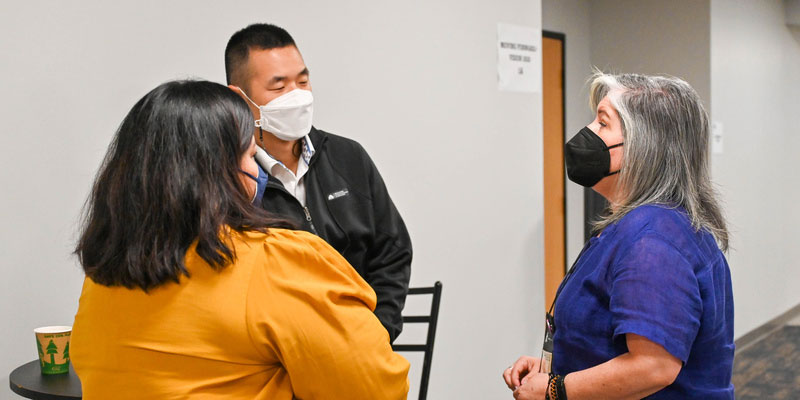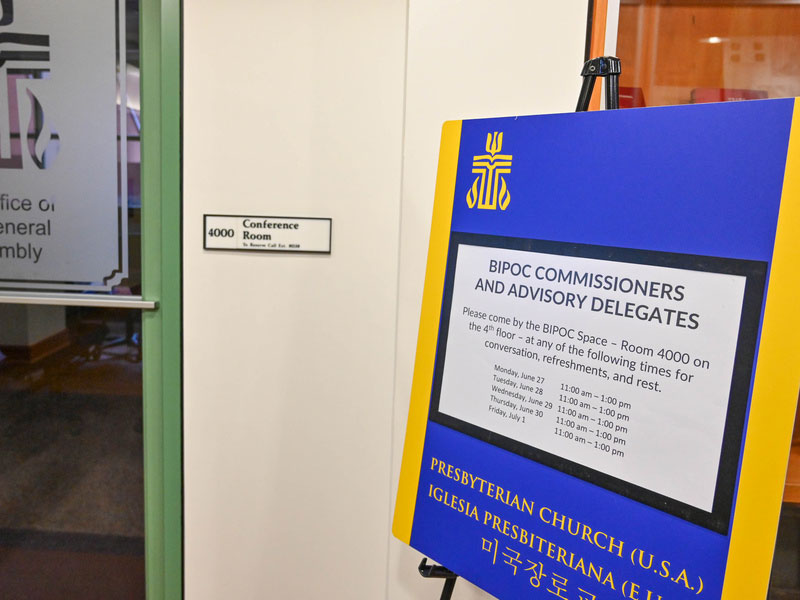
The Rev. Eliana Maxim, right, Vice-Moderator of the Committee on the Office of the General Assembly, talked with people about the BIPOC Space at the 225th General Assembly of the PC(USA) during committee meetings on June 30, 2022 at the Presbyterian Center in Louisville, Kentucky. (Photo by Rich Copley)

The Rev. Eliana Maxim, right, Vice-Moderator of the Committee on the Office of the General Assembly, talked with people about the BIPOC Space at the 225th General Assembly of the PC(USA) during committee meetings on June 30, 2022 at the Presbyterian Center in Louisville, Kentucky. (Photo by Rich Copley)
As the Committee on the Office of the General Assembly (COGA) started planning the 224th General Assembly in 2020, they saw two distinct challenges converging for people of color participating in the Assembly.
Still in the early days of the Covid pandemic, the GA was shortened and entirely virtual.
“Considering the isolation so many of us were experiencing due to the pandemic coupled with the existing challenges of being a person of color in a predominantly white denomination, we quickly scheduled regular Zoom gatherings for BIPOC commissioners,” said COGA Vice Moderator the Rev. Eliana Maxim. “We knew most folks had come to feel comfortable enough with the technology to make use of it and were pleasantly surprised to see the opportunities to gather used.
“For GA225, we decided to provide both virtual and IRL (in real life) space and again have been so pleased to see the turnout.”
valerie izumi, an assistant stated clerk in the Office of the General Assembly, said, “There is often a burden of being a person of color in white spaces, and the BIPOC (Black, Indigenous, People of Color) space for commissioners and advisory delegates was a space where both physically and emotionally commissioners and advisory delegates of color could find respite from having to navigate systems and ways of being that are not part of our natural rhythm or heartbeat.
“What a gift to be able to come together around common experiences and understandings, to be understood, heard and supported.”
izumi worked with Maxim, Sarang Kang of the National Asian Presbyterian Council, and other BIPOC siblings in the church to coordinate the GA225 space. With the committee work done and plenary week ahead of the Assembly, Maxim answered a few questions about the BIPOC space.
Q. What can people expect if they visit the in-person and virtual spaces?
E.M. The BIPOC space — either virtual or not — is a curated space of support, fellowship, resourcing and rest for commissioners and delegates who spend significant number of hours in a day navigating white-dominant spaces, encountering micro (and sometimes macro) aggressions, and simply need a safe space to process all this out. The Zoom calls are a time of sharing what is on our hearts, what we might have experienced in committee or questions we might have on how things are done. The physical space has been a place to bring your lunch and share in fellowship, receive a goody bag, and sometimes even plan or caucus with other BIPOC commissioners. But truthfully, both offerings are a quiet resting place to simply be seen and restored.

The in-person BIPOC Space was open during the committee meetings June 27-July 1 at the 225th General Assembly of the Presbyterian Church (U.S.A.) at the Presbyterian Center in Louisville, Kentucky. (Photo by Rich Copley)
Q. How has the space gone so far? Are people utilizing it in the ways you anticipated? Are there any surprises in how people are using it?
E.M. The spaces are being used and each time is a new experience depending on who shows up. I love that we have ruling elders who have been Presbyterian for half a century, as well as YAADs [Young Adult Advisory Delegates] that are dipping their toes in church leadership, and everyone in between. The variety and diversity of our BIPOC commissioners’ context is so rich, too! Urban and suburban communities, rural and academic. But all come to be one in this experience of being the national church.
Q. Are there any specific aspects of GA or issues being addressed that you understand are bringing people to the space?
E.M. There was one particular committee with BIPOC leadership that was struggling with commissioners’ disrespect, and the space allowed these leaders to process their feelings in a safe way and then strategize on how to address the situation. On the day that the Supreme Court overturned Roe v. Wade, we gathered on our BIPOC Zoom and shared tears, frustration and fear. It was like being enveloped in a virtual hug.
Q. Do you expect the space to continue at future General Assemblies, and if so, how do you expect or hope it will evolve?
E.M. Honestly, I cannot imagine holding a GA in the future without this offering. If we are serious about being an inclusive denomination that seeks to empower and nurture leadership among all people, then we need to be realistic that we are not yet ready to acknowledge, respect and honor BIPOC voices; that there are still many among us who would rather not have to deal with the diversity amongst us and refuse to de-center themselves and the white church experience. The BIPOC space reminds all our Black, Latinx, Indigenous, Asian, API (and more) siblings that they are PC(USA), that they belong and that their leadership matters.
izumi added, “Wouldn’t it be wonderful if BIPOC commissioners and advisory delegates from this Assembly could provide support, information for commissioners and advisory delegates for the next General Assembly as well as strategies for navigating not only the business of the Assembly but caring for oneself in the church and society?
"It is my hope that the relationships started here will continue into the future, and I intend to nurture that possibility.”
